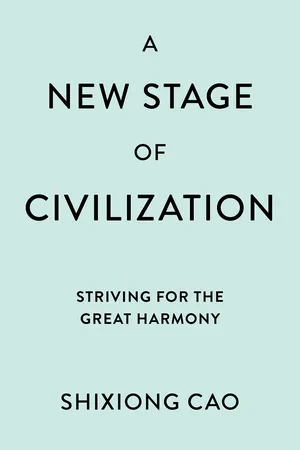
- English
- ePUB (mobile friendly)
- Available on iOS & Android
About this book
For centuries, human "civilisation" has struggled with hatred, conflict, and war since the first people tried to privately own property and protect their resources. The social and economic pressures that "civilisation" has created have placed increasing strain on the institution of private ownership, which is showing signs that it must be replaced by something more modern. To explore the next development stage for society, we must consider how the old paradigms have begun to show their limitations, and what may replace them.
Cao interprets the culture, politics, economics, and the environmental problems that society faces from the perspective of a scholar, exploring potential solutions to the current global political dilemmas and providing intellectual support for a smooth transition of society to the next stage of civilisation. This stage draws on the great harmony proposed by Confucius, by taking steps to eliminate warfare and other forms of conflict and striving to achieve a more harmonious coexistence for everyone. Cao proposes a new perspective for global governance and encourage readers to work to improve the evolution of civilisation.
A New Stage of Civilization: Striving for the Great Harmony will appeal to researchers in a range of fields, including economics, culture, history, politics and sustainability.
Frequently asked questions
- Essential is ideal for learners and professionals who enjoy exploring a wide range of subjects. Access the Essential Library with 800,000+ trusted titles and best-sellers across business, personal growth, and the humanities. Includes unlimited reading time and Standard Read Aloud voice.
- Complete: Perfect for advanced learners and researchers needing full, unrestricted access. Unlock 1.4M+ books across hundreds of subjects, including academic and specialized titles. The Complete Plan also includes advanced features like Premium Read Aloud and Research Assistant.
Please note we cannot support devices running on iOS 13 and Android 7 or earlier. Learn more about using the app.
Information
Table of contents
- Cover Page
- Halftitle Page
- Title Page
- Copyright
- Contents
- About the Author
- Acknowledgements
- Introduction
- Chapter 1 Lessons Learned from the Cold War
- 1.1. Lessons Learned from Communism
- 1.2. The Economic Significance of Ideology
- 1.3. Ideological Evolution
- Chapter 2 Overview on Maintenance Management of Assets
- 2.1. The Historical Evolution of Chinese Culture
- 2.2. Why Has Chinese Culture Survived So Long?
- Chapter 3 The Harm of Centralized Systems for Education
- 3.1. The Dilemma Facing China’s Higher Education
- 3.2. Scientific Development and National Governance
- 3.3. Innovation Needs a Competitive Environment
- Chapter 4 The Origin and Future of a State
- 4.1. Historical Debates About the Meaning of a State
- 4.2. The Origins and Evolution of the State
- 4.3. Solutions Beyond War
- Chapter 5 The Paradox of Government
- 5.1. Government Origins
- 5.2. The Dual Attributes of the Government
- 5.3. Government Governance
- Chapter 6 Economic Development and Social Equity
- 6.1. Construction of a National Economy
- 6.2. The Issue of Poverty
- 6.3. The Resource Curse
- Chapter 7 China’s Rise
- 7.1. Learning from International Experience
- 7.2. China’s Experience with Economic Development
- 7.3. Institutional Innovation in China
- Chapter 8 The Theory of New Social Groups
- 8.1. Lessons Learned from Capitalism
- 8.2. A New Social Group Theory of Institutional Change
- 8.3. The Next Stage of Civilization
- Chapter 9 The Path for Institutional Innovation
- 9.1. The Principle of Balanced Institutional Evolution
- 9.2. The Win–Win Principle of Institutional Evolution
- 9.3. Selection of a Path for Institutional Evolution
- Chapter 10 The Relationships Between Humans and Nature
- 10.1. The Historical Cycle of Ecological Crises
- 10.2. Cycles in the Relationships Between Humans and Nature
- 10.3. The Challenges Facing Current Society
- Chapter 11 Evolution of the Population System
- 11.1. Historical Evolution of Society’s Population System
- 11.2. Causes and Consequences of the Population Decrease
- 11.3. Ethical, Institutional, and Feminist Evolution of Society
- Chapter 12 A Vision for Future Society
- 12.1. Lessons Learned from History
- 12.2. Lessons from History
- 12.3. Toward a New Stage of Society
- References